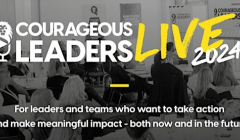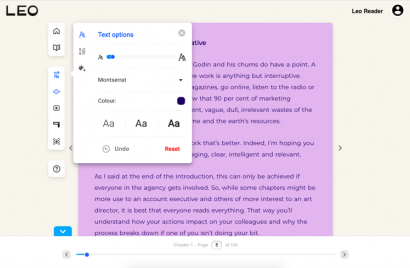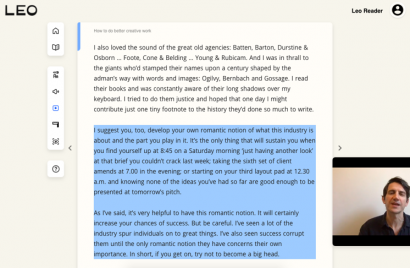
Embracing empowerment and relinquishing control
At Courageous Leaders Live 2024 leaders discuss the importance of time, feedback and making space for others

As a platform, Leo is open, free and available to anyone who should need it, an example of a practical, community-led initiative to inspire and empower the next generation of creatives.

Most, if not all, of the barriers to entry into the creative industries are invisible, so well hidden that their subtleties have allowed for the hiring and firing of a fairly homogenous workforce.
Nowhere is this more true perhaps that when it comes to neurodiversity, one of the least prioritised areas of the diversity and inclusion conversation. Although it is estimated that around 25% of all CEOs are dyslexic, the industry still doesn’t do enough to celebrate the creative firepower of differences. Workplaces aren’t set up for it and employers shy away from it.
Even universities, the gateway into the creative industries don’t create workflows that suit every student. Two thirds of students with dyslexia aren’t able to complete university reading lists with three quarters thinking they’re being put at a disadvantage because of them, according to research from a new free educational platform, Leo.
Leo is determined to change this, setting out to dismantle some of the barriers to entry for dyslexic and neurodivergent talent into the creative industries.
Kat Pegler Co Founder of LEO explained: “On the surface, the advertising and digital industries are set up for people with dyslexia to thrive because they rely on divergent thinking to ensure that the products they are selling are noticed. This kind of thinking is second nature to people with dyslexia who tend to think less linearly, and more holistically than people who are neurotypical. However, each year, students with dyslexia looking to break into the industry are being put at a disadvantage that is blocking their entry: the reading lists that accompany the courses they take.”
Leo is a free online reading library designed to make reading lists readable that allows students, or whoever may need them, to access reading materials in a way that suits their needs. The purpose of the reader is to make it easier to access materials that up until now have been largely text based, with a total focus on books for the creative industries.
Through the reader, there is fully customisable text size, font and colour as well as being able to change the background. Readers can also select whether they’d like to use audio and video alongside the text.
The first book on the platform is Steve Harrison’s How to do Better Creative Work. Each chapter is read aloud by a different creative leader including Grant Hunter, Global ECD at Iris and Rosie Arnold, former Creative Partner and Head of Art at AMV BBDO among others.
The platform was created in partnership with Evert Martin, a UX designer who has dyslexia, as well as through consultation with university students and dyslexia experts. Leo’s founders include James Hillhouse, Co Founder of Commercial Break, Kat Pegler, a former graduate of Commercial Break and Alex Fleming, Senior Manager of Creative Client Solutions at ITV Creative.
As Pegler adds, “it's an absolute no brainer that we should be doing more to help get people with dyslexia into the industry. By making LEO free and available to all, we're hopefully making that a little bit easier.”
As a platform, Leo is open, free and available to anyone who should need it, an example of a practical, community-led initiative to inspire and empower the next generation of creatives. To work to dismantle the barriers to entry and ensure that the industry remains as representative of the world it is trying to reflect.


Looks like you need to create a Creativebrief account to perform this action.
Create account Sign inLooks like you need to create a Creativebrief account to perform this action.
Create account Sign in